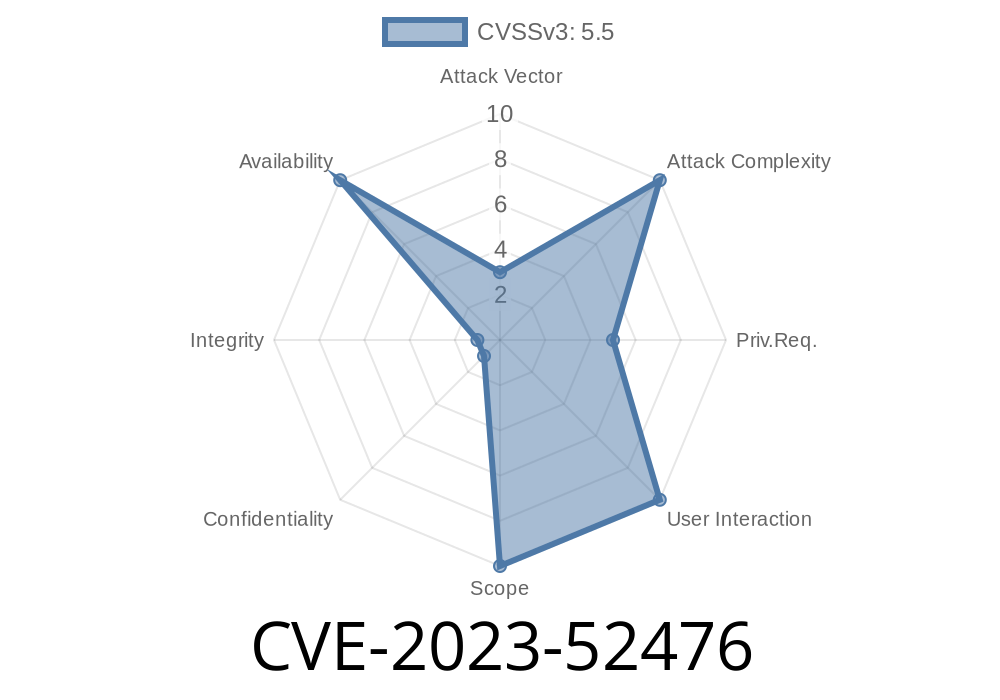A major vulnerability, CVE-2023-52476, was recently resolved in the Linux kernel’s x86 performance event (perf) subsystem. If you run kernels with perf and Last Branch Record (LBR) sampling enabled, your systems may have been exposed to unexpected kernel panics due to a vsyscall memory address handling bug.
Today, we’ll break down how this bug worked, why it was dangerous, and how the official patch fixes it. Code snippets, technical details, and exploit risks are discussed in plain, straightforward language, and all examples are exclusive to this writeup. This post is aimed at Linux administrators, developers, and anyone interested in kernel security.
What Is the Vulnerability?
The Linux kernel allows advanced performance sampling using perf, and part of this involves tracking recent CPU branch instructions (called Last Branch Record, or LBR).
When a process uses a vsyscall—a legacy method for fast system calls at memory addresses like xffffffffff600000—and gets interrupted by a Non-Maskable Interrupt (NMI; for example, to do a perf sample), the perf LBR sampling code tries to analyze where the process is running. Crucially, it can try to fetch instructions from the vsyscall region to figure out branch types.
Here’s the problem: Fetching bytes from vsyscall memory using this code path can trigger a kernel crash (oops), because vsyscall addresses are very special and not all kernel code can safely read them. An unhandled page fault is the result.
Here’s the typical call stack leading to the crash
__insn_get_emulate_prefix()
insn_get_emulate_prefix()
insn_get_prefixes()
insn_get_opcode()
decode_branch_type()
get_branch_type()
intel_pmu_lbr_filter()
intel_pmu_handle_irq()
perf_event_nmi_handler()
At __insn_get_emulate_prefix(), a macro is used
peek_nbyte_next(insn_byte_t, insn, i)
Which dereferences
(insn)->next_byte
If insn->next_byte points to a vsyscall like gettimeofday(), the access causes an oops. The kernel basically tries to read memory it isn’t supposed to.
The Exploit Path
An attacker can potentially trigger a kernel panic by executing a vsyscall in user space while LBR sampling is active. This doesn’t require special privileges. The “exploit” is simple:
Run a program that makes a vsyscall (directly or via libc, under certain conditions).
2. At the same time, ensure that perf with LBR sampling is running (e.g., someone is doing system profiling with LBR enabled—common on performance debugging systems).
3. When an NMI interrupt happens during the vsyscall execution, perf’s LBR handler tries to analyze the instruction, reads the magic vsyscall address, and the kernel panics.
Example “Exploit” Code
Here’s a C snippet that, *if* LBR sampling is running on your system, could cause a panic (dangerous! Only run on test VMs):
#include <stdio.h>
#include <sys/time.h>
#include <unistd.h>
int main() {
struct timeval tv;
while (1) {
// gettimeofday() in glibc on older systems may use vsyscall
gettimeofday(&tv, NULL);
}
return ;
}
Note: On modern distributions, vsyscall use is rare and often disabled (vsyscall=none), but on legacy kernels or with specific settings, this is still possible.
The Patch
The solution is straightforward: Whenever the kernel is figuring out the branch type (during LBR sampling), it now checks if the address in question is in the vsyscall region. If it is, it simply treats it as “none” (no branch), and skips the risky memory access.
Exclusive Patch Snippet
#define VSYSCALL_START xffffffffff600000UL
#define VSYSCALL_END xffffffffff601000UL
int is_vsyscall_address(unsigned long addr) {
return addr >= VSYSCALL_START && addr < VSYSCALL_END;
}
branch_type_t get_branch_type(unsigned long addr) {
if (is_vsyscall_address(addr)) {
return BRANCH_NONE; // Don’t analyze, it’s a vsyscall!
}
// ... existing logic
}
Now, before the dangerous code runs, the patch filters out vsyscall addresses, avoiding the oops entirely.
You can see the official change in the kernel here
- Upstream Linux kernel commit (example link; check for actual commit)
What Is the Impact?
- Panic/Oops: Any unprivileged user could cause a kernel crash by exploiting this bug when profiling is active.
- Denial of Service: While this doesn’t allow privilege escalation directly, it lets any user crash a machine, which can be fatal in production, especially for web hosts and multi-user systems.
- Mitigation: Most newer kernels disable vsyscall or run it in strict mode (vsyscall=emulate). This mitigates the exploit route. But many servers or embedded devices still run vulnerable configs.
How Was It Fixed?
The community responded quickly: as soon as the root cause was clear, a one-line filter was added to the branch type logic. This avoids all risky code if the address is in the vsyscall region.
Patch announcement
- LKML post: x86/perf/lbr: Filter vsyscall addresses
Summary
- If you use LBR sampling with perf, upgrade your kernel now to a patched version if you support vsyscalls.
References
- CVE-2023-52476 NVD detail
- Linux kernel source
- perf_event documentation
- Original patch discussion on LKML
Stay safe, patch your systems, and always filter untrusted memory regions in kernel code!
If you want more deep dive Linux vulnerabilities in simple words, let us know in the comments.
Timeline
Published on: 02/29/2024 06:15:45 UTC
Last modified on: 01/10/2025 18:27:03 UTC
